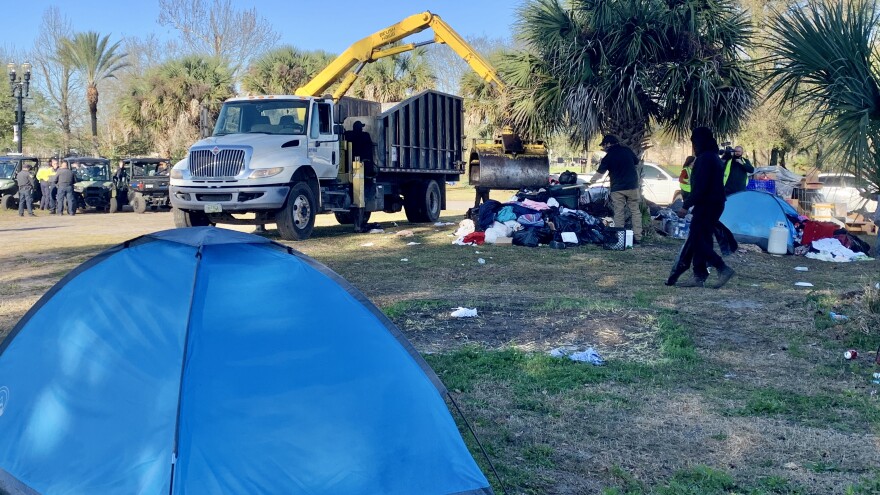Clad all in black, including a black face mask, a man named Daryl was handing out trash bags to the residents of the tent city that occupies a LaVilla block near Downtown Jacksonville Tuesday morning.
“Here you go, boss man,” he said. “Is one gonna do you, or do you need two?”
Daryl, who asked WJCT News not to use his last name to protect his privacy, says he comes by the tent city often to volunteer.
At shortly before 8 a.m., the informal community is already tense. Groups of police officers blocked the entrance, and social workers with name tags and clipboards made the rounds to tent city residents who were still bleary-eyed from sleep. A city excavator clawed at a pile of trash, clothes and tents, lifting load after load into its truck bed.
“This is not right,” said tent city resident Selena Lashon Williams. “The cleaning up the trash is right, but being forced when you’re trying to live? I got displaced, and so now here again I’m being evicted again, I feel.”
Nearby, Daryl agreed. “It’s like moving somewhere from your apartment that you’ve been in, and you move for 30 days, only to move again in 30 days, and you don’t have a place to go back to.”
The closure of the tent city comes just weeks after Mayor Lenny Curry announced a plan to temporarily relocate up to 50 tent city residents into hotels while long-term housing was established for them. Despite that successful effort, the tent city has only grown in recent weeks.
A spokesperson for the city said health and safety code violations necessitated the move, and added tent city residents will be connected to resources while they stay at a temporary shelter run by Sulzbacher.
Jacksonville’s homeless services, like every aspect of society, were thrown for a loop with the arrival of the coronavirus pandemic last year. Shelter capacity was reduced to 50%, and many people on the margins of society were further destabilized.
Daryl said many of the people he knew in the tent city were people whose incomes - whether from a job, from Medicaid or from disability checks - weren’t enough to keep them housed.
“We have Mr. Raymond here, in a wheelchair, on Medicare,” Daryl said, gesturing towards one tent. “A lot of these people get up, get in Ubers every day, go to work, and come back to a tent.”
According to the National Low Income Housing Coalition, a person working a minimum wage job in Florida would need to work 92 hours a week to afford a 1-bedroom apartment.
Contact Sydney Boles at sboles@wjct.org, or on Twitter at @sydneyboles.





